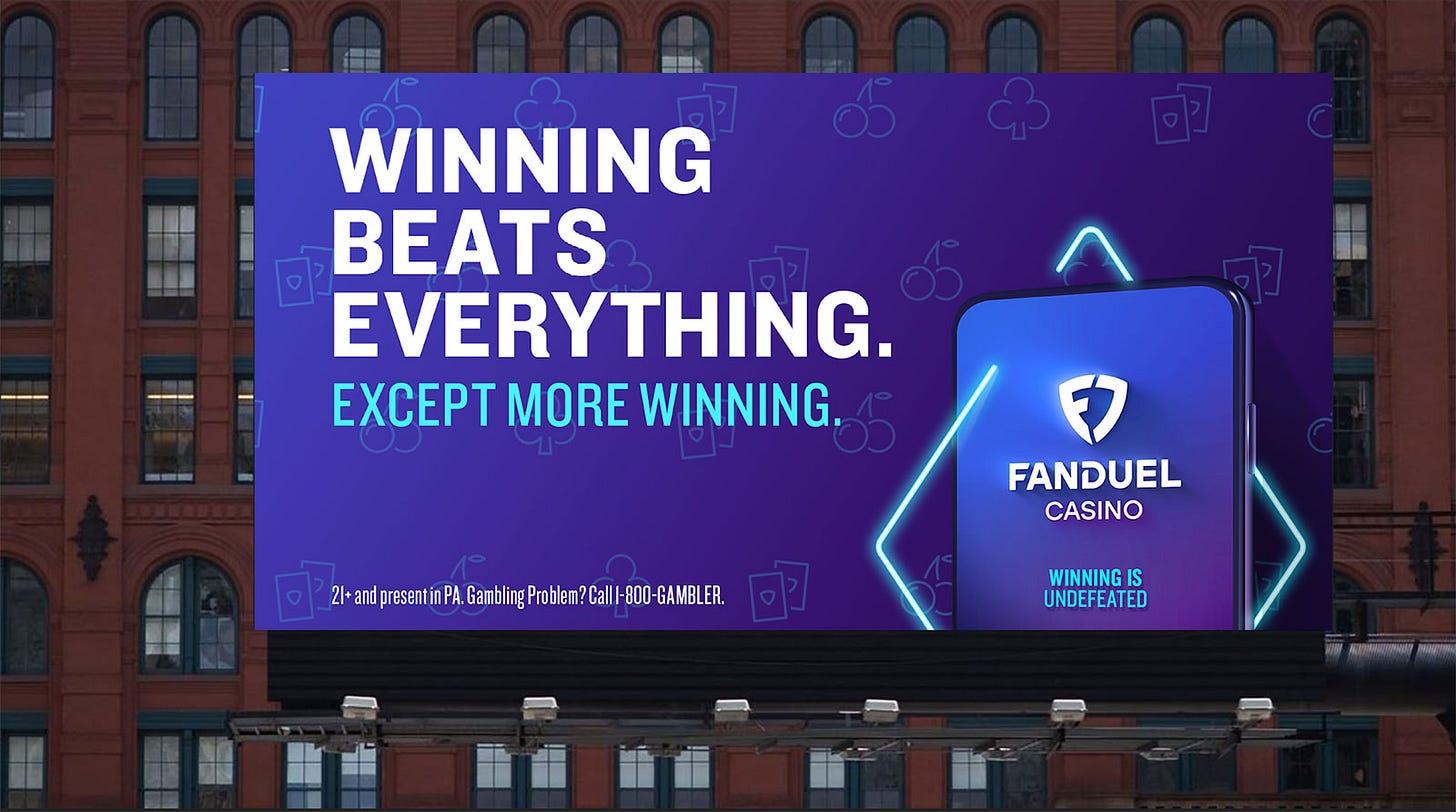The Hypocritic Oath
Hello. Welcome to the Weekend Gene Pool, where we seek your answers and observations in response to questions we ask. We do this entirely for your benefit; participants get the irreplaceable experience of having their views aired and amplified by a great, respected national journalistic institution, We don’t really need your views — we have plenty of our own, thank you very much — but we’re giving you this rare opportunity for growth and fame entirely out of bonhomie and the warmth and kindness of our hearts.
Today’s subject matter is hypocrisy.
Consider online sports betting, the ads for which may well be the most visible current form of institutional sanctimony and hypocrisy. You’ve likely heard these ads, particularly on the radio, particularly for Fanduel, a new corporate bookie making unconscionable profits. Their pitches are fast and furious shitcks to hooch you up, resembling in tone the babble of old-time auctioneers. The TV and online commercials are all kinda like this.
The announcers offer tempting start-up deals — free money, initially, to bet with! (Like Tom Lehrer’s Old Dope Peddler, free for the first time at playgrounds!) Fanduel offers tips on specific games and specific players to back. It offers exotic, play-by-play betting. It feels parimutuel.
And then they sedately slip you a number to call for help if you, kaf kaf, have a gambling problem.
If you are devouring these ads, you have a gambling problem because of these ads.
Stats have shown this. A massive increase in online sports addiction has accompanied the rise in online sports casinos and their omnipresent strong-arm promotions. It’s been studied by psychologists. Part of the problem is that people have been encouraged to feel that sports betting is mostly about skill, not luck. It’s not.
Consider: the followup disclaimer lines — the addiction counseling referrals — mostly occur because government and/or search engines and browsers like Google demand it as a condition for doing business. But that makes them complicit in the hypocrisy; it makes the hypocritical structure behind this whole tawdry field even broader. The hooch and high-pressure is amped up in the ads to counterbalance the dour message at the end. AND government and Google et al are telling themselves the lie that they are not in it just for profits or tax revenue, that they are demonstrating concern for the people — on the basis of a two-word agate line in print ads or a subdued appendix to shouted megaphoned hype on the air. Same thing with the pro sports teams themselves, which for decades have been opposed to any forms of gambling, but suddenly reached an accommodation with their ethics and morals when the size of the profits became un-ignorable.
So. That’s your challenge for today. Send us examples you have seen of modern-day hypocrisy of any sort except one: No well-known political figures. It’s too easy. We are drowning in their hypocrisy and sanctimony every day.
You can talk about almost anything else. It can be the hypocrisy of someone you know, or know of, or a business, or a product, or an artist, or a writer. Anything.
I, for example, know a man who wrote a book, then bought many thousands of them himself, and then returned most to the publisher, in what was widely reported to be a scheme to get the book on bestseller lists. The books was about a shady, corrupt person. The writer got exposed by the pissed-off publishing house.
Send your stories and observations, as always, to the orange stories and observations button. Please do not send them to “comments,” where fewer people will read them.
—
Good, and now for our Gene Pool Gene Poll.
This is a riveting story by my friend Caitlin Gibson, just published in the Wapo. You don’t have to read it, or even skim it, to answer this question, but it may give you an unnerving and possibly new perspective on the subject. Here is the question:
See you all on Tuesday.
Needless to say, perhaps, please feel free to send in Qs and O’s about your thoughts / experiences with possible reincarnation.



Those numbers to call if you have a gambling problem are phonies. I once called asking if I should split eights and they hung up on me.
I never thought I'd see sports gambling advertised on sporting events. Even more astonishing are the "live reads" during the pregame show where -- I still find it hard to fathom -- the game's studio host recommends certain parlay bets on that specific game as "safe."
How is this legal?
And is anybody surprised that athletes and team employees are now getting caught gambling on their games?